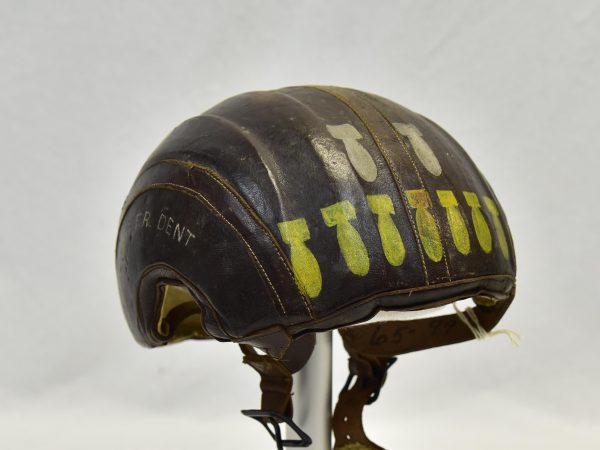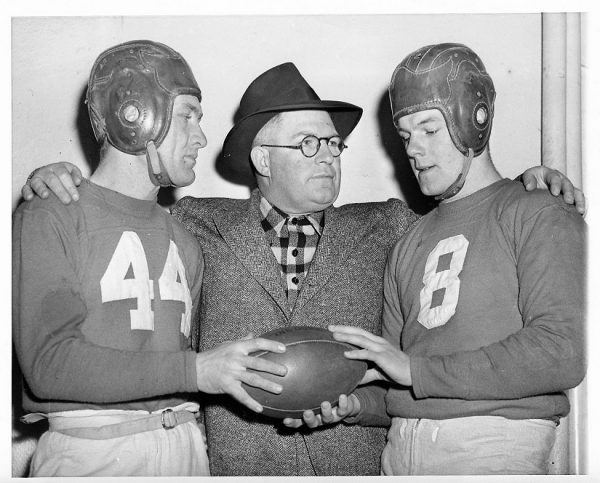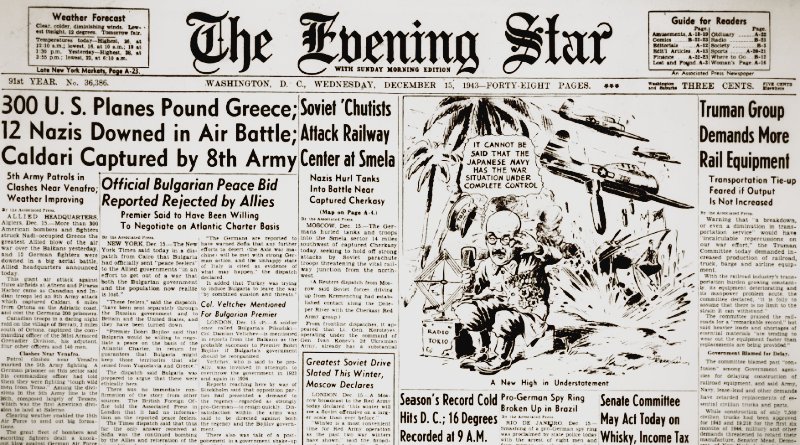World War II Chronicle: December 15, 1943
Click here for TODAY’S NEWSPAPER
Earlier this year we talked about the armor being issued to Eighth Air Force bomber crews. The second page mentions that the airmen will now wear armored helmets, manufactured by the British Wilkinson Sword Company. The “Grow Helmet” featured overlapping manganese steel plates and is covered with leather…

Sports is on page 21 and announces that New York Giants rookie halfback Bill Paschal won the NFL rushing championship, edging out Phil-Pitt Steagles’ Jack Hinkle by one yard. Paschal played just two minutes of college football, ending his career with a knee injury. He went to work on the railroad and by chance ran into Bill Alexander, Paschal’s coach at Georgia Tech one day and told Alexander he was ready to play again. Alexander bumped into sportswriter Grantland Rice at the Sugar Bowl who convinced New York to let Paschal try out. He signed for $1,500 and a star was born.

Roving Reporter by Ernie Pyle
AT THE FRONT LINE IN ITALY, Dec. 15 — It had been my intention to work back into the war gradually by doing maybe a couple of weeks’ columns about how things were in Naples, what Italian women looked like, and whether the Island of Capri was as pretty as they say.
But I don’t know what happened. Something happened. I hadn’t been in Naples two hours before I felt I couldn’t stand it, and by the next evening there I was — up in the mud again, sleeping on some straw and awakening throughout the night with the old familiar crash and thunder of the big guns in my reluctant ears.
It was the artillery for me this time. I went with an outfit I had known in England a year ago last fall, made up largely of men from the Carolinas and eastern Tennessee. Some of you may remember the columns from that time.
This regiment shoots 155-millimeter howitzers. They are terrifically big guns and, Lordy, do they make a noise! The gun weighs six tons, and the shell itself is so big it’s all an ammunition carrier can do to lug one up to the gun pit.
The regiment has all new guns now. I can’t tell you how far they shoot, but as the Caroline boys said, “It’s awful fur.
This regiment’s commander is a good-natured former textile plant executive who fought all through the last war and has already spent nearly a year in the front lines in this one.
He is humorous, as Southern as magnolia, and he loves being alive. He calls every soldier around him by his first name.
He lives in a two-man tent with his executive officer. Right now it’s pitched on a hillside, and they have put big rocks under the lower legs of their cot to make it level. They wash from gasoline tins, and slog a quarter of a mile through deep mud for their meals.
Both are men of refinement and accustomed to fine living back home. The colonel is 50, and living proof that middle-aged men of the right frame of mind can take it at the front.
When I came puffing up the muddy hillside late one afternoon between showers, the colonel was sitting in a canvas chair in the door of his tent, reading a magazine. When I got within about 50 yards he looked up, let out a yell, and called out, “Well’ I’ll be damned if it ain’t my old friend Ernie Pyle! Goshamighty, am I glad to see you! Ansel, this calls for a drink.”
He reached under his cot and brought out a square bottle of some white Italian fluid all full of what looked like sugar Christmas trees. It was a very thick, sweetish substance, which shows what a Southerner can come to who’s been without mint juleps for a year.
This colonel’s teammate is Lieut. Col. Ansel Godfrey, who used to be principal of the high school at Abbeville, S.C., and now he calls Clinton his home. He and I and the colonel sat for two hours while they pumped me about America and told me about Italy.
The colonel said, “Boy, are you a welcome sight! You don’t know how wonderful it is to have somebody new to talk to. Ansel and I have been boring each other to death for months. Today we tell each other what we are going to do tomorrow, and then tomorrow we tell each other we’re doing it. The next day we tell each other we did it. That’s what we’ve been driven to for conversation.”
After supper and a couple of hours with these friends I told them I wanted to go live with one of their gun crews. They said all right, but since it was raining again there might not be much shooting. They said if they did get any orders during the night, they’d have whatever battery I was with do the firing.
So I went down and introduced myself to gun crew and warned them I probably was going to cause them to overwork, for which I apologized. Then I settled gradually in mud up to my knees.
It wound up that I stayed three days and three nights with these boys and got so I felt like a canoneer myself.
Only once did I hear anybody signing the famous artillery song about caissons rolling along. One canoneer hummed it one day during a lull. You could recreate the words in your mind as he was humming, “Over hill, over dale, as we hit the dusty trail…”
What a sardonic line that is in Italy, with our guns hub-deep in black, sloshy, gooey, all-encompassing mud and not a grain of that longed-for dust within a thousand miles.
Pyle is attached to the 178th Field Artillery, and executive officer Ansel B. Godfrey will go on to become a major general and a division commander in the National Guard.
Evening star. (Washington, D.C.), 15 December 1943. Chronicling America: Historic American Newspapers. Lib. of Congress.
https://chroniclingamerica.loc.gov/lccn/sn83045462/1943-12-15/ed-1/
